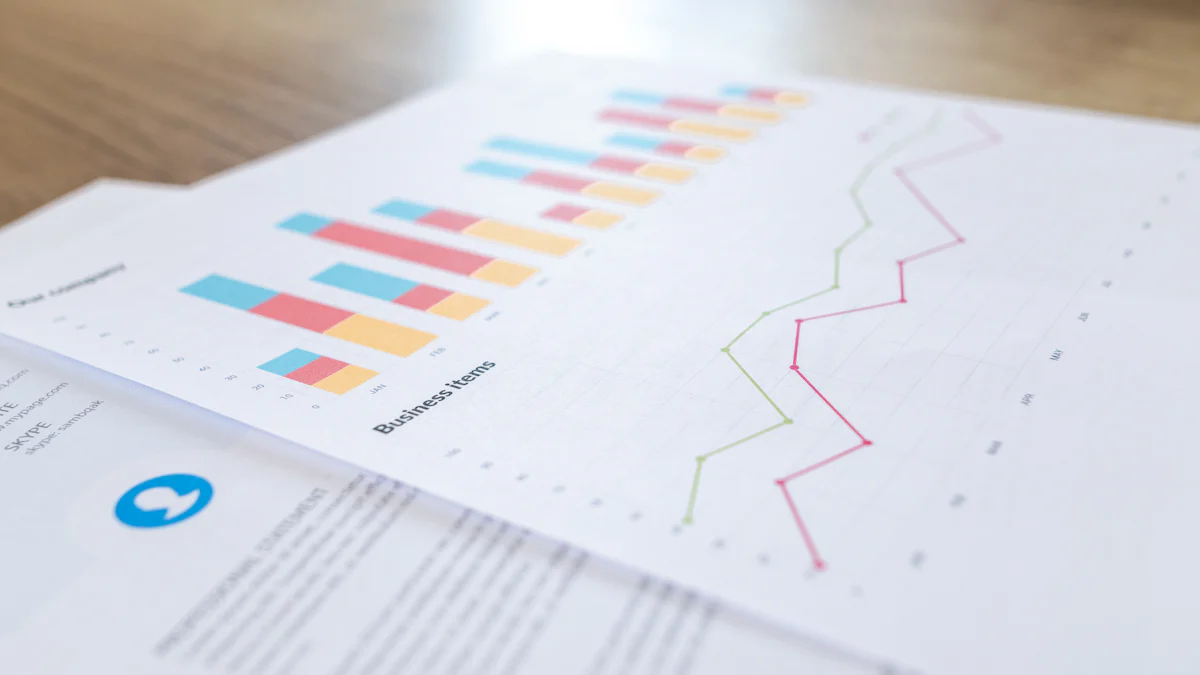Emerging Trends in Strategic Sourcing and Supplier Management for 2025

Strategic sourcing and supplier management play a pivotal role in shaping business success. Companies increasingly recognize sourcing as a top priority, with 35% of procurement departments focusing on it strategically. However, 17% still struggle with complex sourcing processes. As businesses prepare for 2025, understanding procurement trends becomes essential for staying competitive. The shift from cost-cutting to value creation, driven by digital transformation and strategic procurement, highlights the need for innovation. Solutions like JUSDA's JusLink empower organizations to adapt to emerging procurement trends, ensuring efficiency and resilience in supply chains.
📊 Key Insight:
Statistic
Description
66%
Regulatory and ESG demands influence strategic sourcing.
54%
Transparency is the most valued supplier quality.
Digital Transformation in Strategic Sourcing and Supplier Management

The digital transformation of procurement processes has become a cornerstone for businesses aiming to stay competitive. By leveraging advanced technologies like AI, blockchain, and cloud-based platforms, companies can enhance efficiency, transparency, and collaboration in strategic sourcing.
AI and Machine Learning Revolutionizing Procurement
Predictive analytics for demand forecasting
AI revolutionizes procurement by enabling predictive analytics, which helps businesses anticipate supply chain risks and optimize strategies. Machine learning tools analyze historical data to forecast demand with precision, reducing the likelihood of overstocking or stockouts. These insights empower procurement teams to make data-driven decisions, improving efficiency and accuracy. For example, AI-driven demand forecasting allows companies to align inventory levels with market trends, ensuring seamless operations.
Automating supplier selection and evaluation
AI automates routine procurement tasks, such as supplier selection and evaluation, freeing professionals to focus on strategic sourcing. By analyzing supplier performance metrics, AI tools streamline workflows and reduce manual errors. Automation enhances decision-making, ensuring that businesses partner with suppliers who align with their goals. This shift not only saves time but also improves supplier relationships by fostering trust and accountability.
Blockchain Enhancing Supply Chain Transparency
Improving traceability and trust in supplier relationships
Blockchain technology has transformed supply chain transparency by creating immutable records of transactions. Companies like Walmart and Pfizer have successfully implemented blockchain to enhance traceability. Walmart, for instance, reduced the time needed to trace mangoes to just 2.2 seconds, ensuring food safety. Similarly, Pfizer uses blockchain to track batch numbers and expiration dates, improving security and trust in pharmaceutical supply chains.
Company | Industry | Application |
|---|---|---|
Walmart | Food | Collaborated with IBM to trace mangoes in 2.2 seconds, improving food safety and quality. |
Pfizer | Pharmaceuticals | Partnered with Chronicled to track batch numbers and expiration dates, enhancing security and traceability. |
Ford | Automotive | Developed the Automotive Blockchain Consortium to verify the origin of auto parts and enhance trust. |
Reducing fraud and errors in procurement transactions
Blockchain minimizes fraud and errors by providing a secure, immutable record of transactions. This technology offers a single source of truth for all stakeholders, reducing the need for intermediaries and lowering operational costs. Enhanced visibility ensures accountability, making blockchain an indispensable tool for modern procurement.
Cloud-Based Solutions for Real-Time Collaboration
Leveraging platforms like JusLink for centralized data and decision-making
Cloud-based platforms like JusLink enable centralized data management, allowing businesses to make real-time decisions. These platforms provide scalability, flexibility, and secure data storage, ensuring seamless collaboration between buyers and suppliers. JusLink’s features, such as AI-driven forecasting and intelligent risk management, further enhance operational efficiency.
Enhancing supplier collaboration through cloud technology
Cloud tools improve visibility in supplier relationships, standardizing communication formats and automating document exchange. This streamlines supply chain management, reducing labor expenses and optimizing processes. Effective collaboration through cloud platforms can also lower material usage and transportation costs, making them essential for businesses embracing sustainability.
💡 Tip: Companies adopting cloud-based solutions often experience significant cost savings and improved operational efficiency, making these tools a vital part of digital transformation.
Sustainability and ESG in Procurement

Sustainability has become a cornerstone of modern procurement trends, with businesses increasingly prioritizing ESG metrics to align with regulatory demands and consumer expectations. Companies adopting sustainable procurement tactics not only meet compliance requirements but also enhance their brand reputation.
ESG as a Core Driver in Strategic Sourcing
Meeting regulatory and compliance requirements
Governments and organizations worldwide are introducing stricter ESG regulations. Businesses must adapt to these changes to remain competitive. Key regulations like the European Sustainability Reporting Standards (ESRS) and the Corporate Sustainability Due Diligence Directive (CSDDD) require companies to disclose ESG metrics and ensure ethical sourcing compliance.
Regulation | Description | Effective Date |
|---|---|---|
ESRS | European Sustainability Reporting Standards | 2024 |
EFRAG | European Financial Reporting Advisory Group | 2024 |
CSDDD | Corporate Sustainability Due Diligence Directive | 2024 |
Building brand reputation through sustainable practices
Sustainable sourcing strategies help businesses build trust with stakeholders. By adopting ESG goals, companies demonstrate their commitment to ethical practices and waste reduction. This approach attracts eco-conscious consumers and impact investors, enhancing long-term profitability.
Circular Supply Chains for a Sustainable Future
Reducing waste through recycling and reuse
Circular supply chains focus on minimizing waste by reusing materials. Innovations like Mura Technology’s HydroPRS, which converts plastic waste into oil, and HYDAC’s recyclable Air-X filters exemplify this approach. These methods reduce environmental impact while improving efficiency and cost savings.
Increased efficiency through resource optimization.
Cost savings by reusing materials.
Reduced environmental impact through thoughtful material use.
Improved brand reputation among eco-conscious stakeholders.
Partnering with eco-conscious suppliers
Collaborating with suppliers who prioritize sustainability ensures ethical sourcing compliance. This partnership strengthens supply chain resilience and aligns with sustainability goals, preparing businesses for future challenges.
Carbon Footprint Reduction in Supply Chains
Measuring and managing emissions with digital tools
Digital transformation plays a vital role in emissions management. Tools like carbon emissions calculators provide real-time tracking and help businesses set reduction targets. These tools also ensure compliance with ESG metrics and industry standards.
Real-time emissions tracking across transportation modes.
Advanced analytics for actionable insights.
Integration with spend management solutions for comprehensive visibility.
Incentivizing suppliers to adopt green practices
Businesses can encourage suppliers to adopt sustainable practices by offering incentives. Collaborating with suppliers who share ESG goals fosters innovation and reduces emissions across the supply chain.
🌍 Note: Companies that prioritize sustainability in procurement gain a competitive edge while contributing to global environmental goals.
Supplier Collaboration and Innovation as a Strategic Business Driver
Supplier collaboration has emerged as a cornerstone of strategic value creation in modern procurement trends. Businesses increasingly recognize the importance of fostering innovation and resilience through strong supplier relationships. By leveraging AI and digital transformation, companies can unlock value creation beyond cost savings.
Co-Creation of Value with Suppliers
Joint product development and innovation
Collaborating with suppliers on product development drives innovation and accelerates time-to-market. Businesses benefit from shared expertise, reduced costs, and enhanced risk management. For instance:
Unilever’s Open Innovation platform engages external innovators, resulting in over 60% of research projects involving external collaboration.
IKEA’s ‘Co-Create IKEA’ platform invites customer input, generating thousands of product ideas and licensing agreements.
These examples highlight how supplier collaboration fosters creativity and strategic value creation.
Strengthening long-term partnerships
Strong supplier relationships ensure mutual growth and stability. Long-term partnerships enable businesses to align goals, share resources, and build trust. This approach enhances supplier relationship management, creating a foundation for sustained success.
Risk Sharing and Building Resilient Supply Chains
Diversifying supplier bases to mitigate risks
Diversification reduces dependency on single suppliers, ensuring business continuity during disruptions. Effective strategies include:
Spreading risks across multiple suppliers and locations.
Maintaining alternative sources to prevent delays.
Negotiating better pricing through competition.
Enhancing resilience by adjusting production strategies.
These measures strengthen supply chains, ensuring agility and compliance with sustainability goals.
Developing contingency plans for supply chain disruptions
Proactive risk management involves creating contingency plans. Businesses can:
Conduct risk assessments to anticipate disruptions.
Monitor risks continuously to stay prepared.
These steps enhance resilience and minimize operational downtime.
Supplier Performance Management with Advanced Tools
Leveraging KPIs for continuous improvement
Key performance indicators (KPIs) provide measurable insights into supplier performance. Metrics such as defect rate, lead time, and order accuracy help businesses identify areas for improvement. Regular evaluation ensures suppliers meet expectations, driving continuous improvement.
Real-time monitoring of supplier performance using platforms like JusLink
AI-powered platforms like JusLink enable real-time performance tracking. Benefits include:
Early identification of risks for timely interventions.
Improved supplier relationships through transparency.
Cost savings by addressing inefficiencies.
JusLink’s advanced tools empower businesses to optimize supplier management, ensuring strategic value creation.
💡 Tip: Strong supplier collaboration and effective risk management are essential for building resilient supply chains in today’s dynamic market.

JusLink Solutions
To provide you with professional solutions and quotations.
Data-Driven Decision Making in 2025 Procurement Trends
Advanced Analytics for Cost Optimization
Identifying cost-saving opportunities through data insights
Predictive analytics has become a cornerstone of modern procurement strategies. By analyzing historical data and applying statistical algorithms, businesses can forecast future scenarios with remarkable accuracy. This approach allows companies to anticipate demand, refine supplier selection, and identify cost-saving opportunities. For instance, an electronics manufacturer can analyze historical trends in copper prices to determine the optimal time for procurement, effectively managing costs and reducing financial risks. AI and big data analytics further enhance this process by enabling organizations to process vast datasets, ensuring better decision-making and value optimization.
Enhancing negotiation strategies with predictive analytics
Predictive analytics transforms supplier negotiations into a data-driven process. By delving into supplier performance metrics, pricing trends, and market dynamics, procurement teams gain a strategic advantage. These insights allow businesses to negotiate favorable contracts, enhance supplier performance, and ensure compliance with regulatory standards. Leveraging AI tools, organizations can predict market fluctuations and adjust their strategies accordingly, leading to improved cost efficiency and stronger supplier relationships.
Real-Time Data Integration for Supply Chain Visibility
Improving decision-making with integrated data platforms
Real-time data integration offers immediate insights into supply chain operations. This capability minimizes reliance on estimates, enhancing inventory management and forecasting accuracy. Managers can address disruptions promptly, ensuring smooth operations and reducing costs. Integrated platforms like JusLink provide centralized data access, enabling businesses to make informed decisions and maintain supply chain efficiency.
Enabling faster responses to supply chain disruptions
Access to real-time data empowers businesses to respond swiftly to market changes and disruptions. Immediate visibility into supply chain activities allows companies to mitigate risks before they escalate. This agility ensures operational continuity and strengthens supplier relationship management, a critical component of modern procurement trends.
Cybersecurity in Supplier Data Management
Protecting sensitive supplier information
Cybersecurity remains a top priority in supplier data management. Companies must implement robust measures such as access controls, encryption, and regular security assessments to safeguard sensitive information. Developing comprehensive cybersecurity policies and providing employee training further enhances protection. Monitoring emerging threats ensures businesses stay ahead of potential risks.
Mitigating risks of data breaches in procurement systems
Supply chains face numerous cybersecurity threats, including phishing attacks, ransomware, and data breaches. Cybercriminals often exploit vulnerabilities in vendor systems to gain unauthorized access. Businesses can mitigate these risks by conducting regular data protection assessments, standardizing security practices, and collaborating with suppliers to ensure robust defenses. These measures protect procurement systems and maintain trust across the supply chain.
🔒 Tip: Strengthening cybersecurity in procurement not only protects sensitive data but also enhances supplier collaboration and trust.
Workforce Transformation in Strategic Sourcing and Supplier Management
The workforce in procurement is evolving rapidly, driven by technological advancements and shifting workplace dynamics. Companies must invest in upskilling, diversity, and adaptability to remain competitive in this changing landscape.
Upskilling Procurement Teams for the Digital Era
Training in AI, blockchain, and other digital tools
Procurement teams must embrace digital transformation by mastering technologies like AI and blockchain. Training programs tailored to these tools help employees understand their applications in procurement. For example, AI can automate supplier evaluation, while blockchain enhances supply chain transparency. Companies should assess current skill levels, provide targeted workshops, and foster continuous learning to keep teams updated. Change management initiatives also play a critical role in addressing resistance and highlighting the benefits of these technologies.
Developing strategic thinking and negotiation skills
Strategic thinking and negotiation are essential for aligning procurement goals with broader business objectives. Employees must learn to analyze market trends, anticipate risks, and develop data-driven strategies. Negotiation training enhances supplier relationships and ensures favorable contracts. These skills, combined with digital literacy, prepare teams to navigate the complexities of modern procurement.
Skill | Description |
|---|---|
Understanding how to leverage digital tools to drive insights and make data-driven decisions. | |
Strategic Thinking and Business Acumen | Aligning procurement initiatives with overall company goals to add value to the organization. |
Sustainability and Circular Economy | Knowledge of lifecycle analysis and sustainable sourcing strategies as a core focus for organizations. |
Relationship Management and Collaboration | Strong interpersonal skills for effective collaboration across departments and with suppliers. |
Adaptability and Continuous Learning | Ability to evolve with the rapidly changing procurement landscape. |
Embracing Diversity and Inclusion in Procurement
Building diverse supplier networks for innovation
Diverse supplier networks foster innovation by introducing fresh perspectives and solutions. Companies with supplier diversity programs report higher ROI and lower operating costs. These networks also promote competition, reduce prices, and provide access to new markets. Partnering with small and medium-sized enterprises (SMEs) and minority-owned businesses (MBEs) demonstrates a commitment to local economic growth.
Benefit | Description |
|---|---|
ROI | Companies with long-term supplier diversity programs generate 133% greater ROI. |
Cost Savings | Supplier diversity programs drive an additional $3.6 million to the bottom line per $1 million spent. |
Lower Operating Costs | Procurement organizations with diverse suppliers spend 20% less on buying operations. |
Encourages innovation through agile SMEs.
Expands procurement channels for better sourcing opportunities.
Strengthens local economies by contracting with SMEs and MBEs.
Promoting inclusive hiring practices in procurement teams
Inclusive hiring practices ensure diverse perspectives within procurement teams. This approach fosters creativity and improves decision-making. Companies that prioritize diversity in hiring also enhance their reputation and attract top talent. By creating equitable opportunities, organizations build stronger, more innovative teams.
Adapting to Remote and Hybrid Work Models
Leveraging technology for virtual collaboration
Remote and hybrid work models require robust digital tools to maintain collaboration. Platforms like JusLink enable real-time communication and data sharing, ensuring seamless operations. Flexible managers play a key role in fostering team connections, with 90% of employees reporting stronger relationships with supportive leaders. Clear communication about expectations and shared responsibilities further enhances productivity.
“The clients that we’ve seen implement hybrid working successfully have really clear communication around what it means to be flexible, and around the shared responsibility everyone has to make it work together,” says Ketter.
Maintaining productivity in decentralized teams
Decentralized teams face challenges in maintaining morale and equity. Companies must prioritize fairness and ensure all employees feel valued. Regular check-ins, virtual team-building activities, and transparent policies help sustain productivity. Employees with flexible work options report improved company culture, with 76% noting positive changes.
“One of the challenges with hybrid working will be maintaining strong cultures, morale and camaraderie among team members—and ensuring fairness and equity both in practice and in perception.”
Tracy Brower, Forbes
The trends shaping strategic sourcing and supplier management in 2025 highlight the importance of risk management, sustainability, and digital transformation. Companies are prioritizing resilient supply chains and leveraging ai-driven tools to optimize procurement processes. For instance:
Businesses are diversifying supplier bases, with 44% of executives focusing on this strategy to mitigate disruptions.
A growing number of organizations are working with fewer, more reliable suppliers to enhance risk management.
In today’s volatile business landscape, procurement risk management and supply chain resilience are paramount. Geopolitical risks, natural disasters, and market fluctuations pose significant challenges to organizations worldwide. Companies are turning to advanced technologies and strategies to enhance their risk assessment capabilities and strengthen their supply chains.
Proactively adapting to these trends ensures operational efficiency, stronger supplier relationships, and a focus on sustainability. Businesses that embrace ai and digital transformation can create value, drive innovation, and build resilient supply chains. Solutions like JusLink empower organizations to stay competitive by enhancing collaboration and streamlining procurement processes.
See Also
Top 5 Trends Shaping Future Supply Chain Efficiency
Sustainable Robotics Trends Transforming Supply Chain Management
Mastering Supply Chain Strategies for 2024 Manufacturing Success
How Cloud Solutions Are Revolutionizing Supply Chain Management
